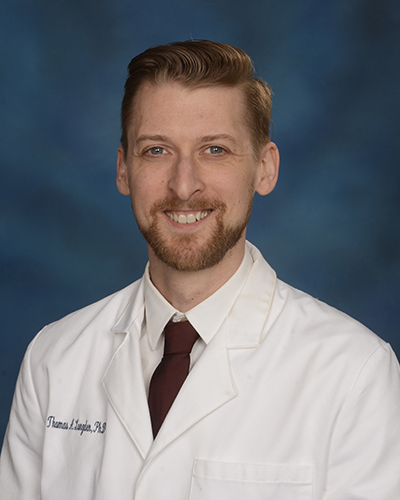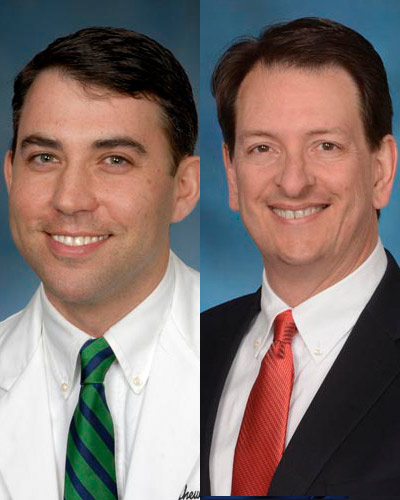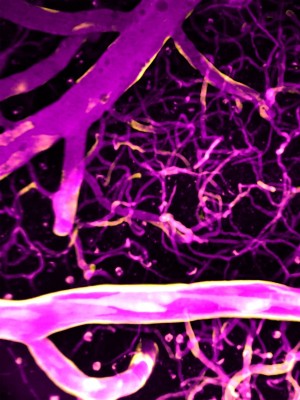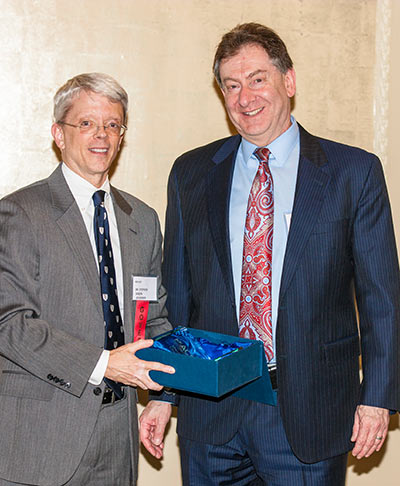October 06, 2020 | Deborah Kotz

$2.3 million Award Targeted for “High-Risk, High Reward” Research that Aims to Understand Contribution of Blood Flow to Brain Plasticity
Thomas Longden, PhD, Assistant Professor in the Department of Physiology at the University of Maryland School of Medicine (UMSOM), has received the National Institutes of Health (NIH) Director’s New Innovator Award. The award provides $2.3 million to support an “exceptionally creative early career investigator” as part of The High-Risk, High-Reward Research Program of the NIH Common Fund. The award is reserved for scientists at the beginning of their independent research careers, before receiving other research program funding from the NIH.
“We are very honored to receive this award,” said Dr. Longden. “I am confident that the upcoming research that this enables will lead to advances in our understanding of brain plasticity, and may help in finding new treatments for brain disorders with a blood flow component, such as Alzheimer’s disease and stroke.”
Dr. Longden’s laboratory focuses on the control of blood flow in the brain, specifically on the moment-to-moment regulation of blood flow in response to nerve activity—a process that is important for normal brain function to deliver enough nutrients and oxygen to cells. When blood flow is disrupted, this can result in nerve cell dysfunction due to these cells not getting the energy supplies they need. This complex phenomenon, which forms the basis of functional MRI, involves a dynamic interplay between the cells of the neurovascular unit, including neurons, astrocytes, pericytes, endothelial cells and arteriolar smooth muscle.
He plans to apply the NIH award funds to develop new tools and approaches to study a novel form of plasticity his group has identified in the mechanisms that underlie an increase in blood flow in the brain called functional hyperemia, for which Dr. Longden has coined the term “vascular signaling plasticity”. The overall goal of the work is to understand this new dimension to brain plasticity from the molecular to whole-animal level, which may have implications for our understanding of how learning and memory work, and how the neuronal function is lost in disease. Thus, the team will also explore how vascular signaling plasticity becomes disrupted in dementias such as Alzheimer’s disease.
Dr. Longden came to UMSOM in 2019 after performing post-doctoral work at the University of Vermont. He received his PhD in Pharmacology in 2010 from the University of Manchester (UK), and received his bachelor’s degree in 2006 from the same institution.
“I am so proud that the NIH has once again recognized the innovative talents of our young scientists,” said E. Albert Reece, MD, PhD, MBA, Executive Vice President for Medical Affairs, UM Baltimore, the John Z. and Akiko K. Bowers Distinguished Professor and Dean, University of Maryland School of Medicine “We are grateful that the federal government values their work and is willing to invest in potential new discoveries. I am excited to see what new insights we learn about the brain from this high-impact research.”
The NIH’s High-Risk, High-Reward Research program catalyzes scientific discovery by supporting highly innovative research proposals that, due to their inherent risk, may struggle in the traditional peer review process despite their transformative potential. Program applicants are encouraged to think outside-the-box and to pursue trailblazing ideas in any area of research relevant to the NIH mission.
“The breadth of innovative science put forth by the 2020 cohort of early career and seasoned investigators is impressive and inspiring," said NIH Director Francis S. Collins, M.D., Ph.D. “I am confident that their work will propel biomedical and behavioral research and lead to improvements in human health.”
About the University of Maryland School of Medicine
Now in its third century, the University of Maryland School of Medicine was chartered in 1807 as the first public medical school in the United States. It continues today as one of the fastest growing, top-tier biomedical research enterprises in the world -- with 45 academic departments, centers, institutes, and programs; and a faculty of more than 3,000 physicians, scientists, and allied health professionals, including members of the National Academy of Medicine and the National Academy of Sciences, and a distinguished two-time winner of the Albert E. Lasker Award in Medical Research. With an operating budget of more than $1.2 billion, the School of Medicine works closely in partnership with the University of Maryland Medical Center and Medical System to provide research-intensive, academic and clinically based care for nearly 2 million patients each year. The School of Medicine has more than $540 million in extramural funding, with most of its academic departments highly ranked among all medical schools in the nation in research funding. As one of the seven professional schools that make up the University of Maryland, Baltimore campus, the School of Medicine has a total population of nearly 9,000 faculty and staff, including 2,500 student trainees, residents, and fellows. The combined School of Medicine and Medical System (“University of Maryland Medicine”) has an annual budget of nearly $6 billion and an economic impact more than $15 billion on the state and local community. The School of Medicine faculty, which ranks as the 8th highest among public medical schools in research productivity, is an innovator in translational medicine, with 600 active patents and 24 start-up companies. The School of Medicine works locally, nationally, and globally, with research and treatment facilities in 36 countries around the world. Visit medschool.umaryland.edu
Contact
Office of Public Affairs
655 West Baltimore Street
Bressler Research Building 14-002
Baltimore, Maryland 21201-1559
Contact Media Relations
(410) 706-5260
Deborah Kotz
410-706-4255
dkotz@som.umaryland.edu
Related stories

Thursday, September 14, 2023
UMSOM Researchers Identify Important New Signaling Molecule Involved in Vascular Health
In the 25 years since the Nobel Prize was awarded for discovering the role that nitric oxide (NO) plays in the cardiovascular system, researchers have been racing to learn more about how this mysterious signaling molecule works to repair blood vessels damaged by a heart attack, stroke or other cardiovascular event. University of Maryland School of Medicine (UMSOM) researchers and their Wake Forest University (WFU) colleagues today announced an important missing piece of the puzzle.

Tuesday, October 19, 2021
UM School of Medicine Establishes Two New Endowed Professorships and Center for Pathogen Research through Private Gifts and Matching State Funds
University of Maryland School of Medicine (UMSOM) Dean E. Albert Reece, MD, PhD, MBA, announced today that the school of medicine has been awarded $1.25 million in matching funds from the Maryland E-Nnovation Initiative Fund (MEIF), administered by the Maryland Department of Commerce. The funds, totaling $2.5 million when combined with private philanthropy, will enable the establishment of a new Center for Pathogen Research. They will also enable the UMSOM to support research professorships in the Department of Microbiology and Immunology and the Department of Neurology.

Wednesday, July 21, 2021
University of Maryland School of Medicine Study Finds Calcium Precisely Directs Blood Flow in the Brain
University of Maryland School of Medicine and University of Vermont researchers have shown how the brain communicates to blood vessels when in need of energy, and how these blood vessels respond by relaxing or constricting to direct blood flow to specific brain regions.

Wednesday, June 16, 2021
UM School of Medicine Researchers Awarded $5 Million NIH Grant to Improve Use of Genetic Risk Scores in Diverse Populations
Researchers at the University of Maryland School of Medicine (UMSOM) have received a $5 million federal grant to pool genomic information from existing and new datasets – predominantly in African and African American populations -- in order to calculate the risk of developing specific diseases. They will use sophisticated modeling and genetic datasets to calculate the risk, known as a polygenic risk score, with an emphasis on studying people from different ancestries.

Thursday, March 30, 2017
University of Maryland School of Medicine's Dr. Stephen Davis Receives Top Award from National Physician's Group
Stephen Davis, MBBS, FRCP, MACP, the Theodore E. Woodward Endowed Chair and the Professor and Chairman of the Department of Medicine at the University of Maryland School of Medicine (UM SOM); Director of the General Clinical Research Center and the Clinical Translational Science Institute; and Vice-President of Clinical Translational Science for the University of Maryland, Baltimore campus, has been awarded Mastership in the American College of Physicians (ACP), the national organization of internists.

Thursday, March 02, 2017
University of Maryland School of Medicine Dr. Stephen Davis Receives Top Clinical Research Award From State Physician's Group
Stephen Davis, MBBS, FRCP, MACP, the Theodore E. Woodward Endowed Chair and the Professor and Chairman of the Department of Medicine at the University of Maryland School of Medicine (UM SOM); Director of the General Clinical Research Center and the Clinical Translational Science Institute; and Vice-President of Clinical Translational Science for the University of Maryland, Baltimore campus, has received the Mary Betty Stevens Award for Outstanding Clinical Research from the Maryland Chapter of the American College of Physicians (ACP).
